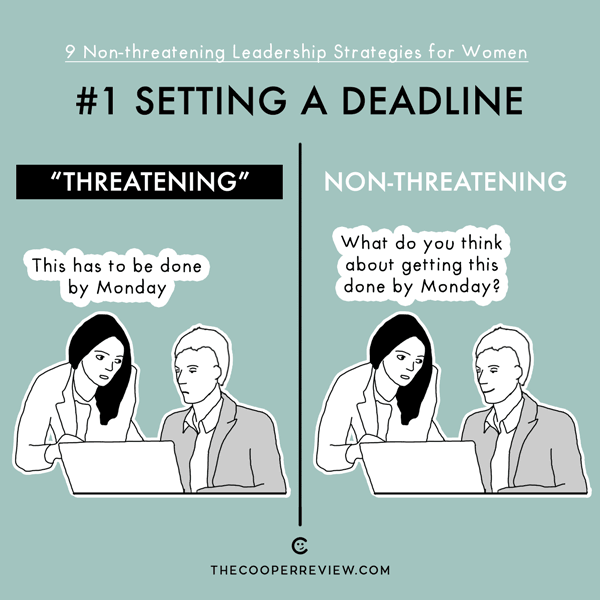When I shared Sarah Cooper’s brilliant comic ‘9 Non-Threatening Leadership Strategies for Women’ on my Facebook wall, the most surprising reactions came from a few of my female friends — who took it seriously.

Let’s just take a minute to think about it: they took Cooper’s snarky and subversive advice seriously. They really thought someone was telling them that women should couch their completely legitimate professional demands in sweet talk; saying ‘it would be great if you could do this by Monday’ instead of ‘please make sure this gets done by Monday’ and adding unnecessary emojis and exclamation marks.
No, they were not deficient in humour. It’s just that they had been conditioned by years of people telling them women should be polite, sweet, charming and girlish. By years of ambitious female managers being portrayed in movies and on television as shrill, unreasonable monsters. And by their own experiences in offices and conference rooms, where they routinely hold themselves back from expressing their views strongly because male colleagues laugh and say ‘chill yaar’ and bosses smile indulgently or wonder aloud if it’s ‘that time of the month’ (yes, this has actually happened to someone I know).
And all this does not change merely because many of those same people now run startups and meet in coffee shops instead of boardrooms or sit on bean bags instead of swivel chairs. Of course it does not. Buying into the myth of the cool startup life is easier than accepting your hardwired cultural biases and fighting them. Disrupting shopping or food delivery or financial investments or texting is perhaps easier than disrupting expectations of women at the workplace and gender stereotypes. And because over 90% of Indian startups are founded by men (as per the Nasscom Startup India Report 2015), it’s the male point of view and behaviour patterns that come to be normalised.
Sairee Chahal, founder and CEO of Sheroes, says very often, she observes a kind of obliviousness among male startup founders. “There is no consciousness of gendered behaviour. It doesn’t bug them at all that they are an all-male team. That there are no women in leadership positions, and only a few in support roles. It’s like the 1960s all over again, where all the women were secretaries. This is just a different, updated version of that,” says Chahal.

She adds, though, that she does see this consciousness among some male startup founders who are making a conscious effort to hire more women in top roles, mentioning a conversation she had recently with Cleartax CEO Archit Gupta. But that’s relatively rare. “Being aware that there is a need — that’s the bigger challenge. Lots of companies still openly say things like ‘we can’t hire women for these roles, you need someone who can practically live in the office’ or ‘we need someone really aggressive for this job,” she adds.
I know someone who used to work with a content marketing firm, which worked with several companies, including startups, on a regular basis. At one such startup office, her company had sent a long-term resource for a project that my friend was monitoring. The person assigned to the startup was a quiet, conservative, middle-class woman who was excellent at her job, but not so much at socialising.
This efficient woman’s fault was said to be she “did not fit in with our culture.”
Strangely, the leadership team at the startup found fault with her work and complained about her frequently, and finally asked for a different resource to be assigned to them — specifying their needs as “a guy or a cool girl.” This efficient woman’s fault was said to be she “did not fit in with our culture.” She didn’t drink beer at her desk or smoke or throw a basketball around.
At this same startup, my friend, who is a no-nonsense, straight-talking woman who doesn’t mince or soften her words to get her point across was humiliated several times and treated aggressively for no reason. She finally realised they couldn’t handle her no-nonsense approach.
They needed a bro.
Real men don’t have domestic problems
Let’s talk about expectations from female employees in major roles. No one doubts that you need a strong level of commitment to work at a startup and that you better be prepared to put your life on hold for reasonable amounts of time — least of all female employees. They get into it with their eyes open because more often than not, they deal with more than their fair share of domestic responsibilities. But yeah, they sometimes also need to take care of stuff — a child or parent falling ill, the maid not turning up, PTA meetings — that many male founders can afford to completely neglect.
In fact, most Indian men can practically shut down their personal lives for a year or two, because mothers or wives are taking care of all that shit. They routinely prioritise work over life — leaving their (working) wives to deal with the kids’ minor illnesses or domestic fuck-ups. Often, this is done with a ‘throwing hands in the air’ gesture — ‘you deal with it, I’m too busy’. And often, the woman sighs and calls her boss to say she’ll be late in order to save her husband the humiliation of having to tell his colleagues ‘I’m taking my child to the doctor.’
In fact, most Indian men can practically shut down their personal lives for a year or two, because mothers or wives are taking care of all that shit.
Because, you know, real men don’t have such problems.
This boring machismo is another aspect of startup culture that seriously needs to change, and that founders need to recognize. It’s NOT normal to live at the office and get your wife to deal with everything at home, and then judge your female co-worker because she has to leave a meeting to book an Uber for her parents.
Here’s something really disruptive to think about: What she’s doing is perfectly normal; what you’re doing is unnatural, entitled and just plain asshole.
This was brought home to me a few months ago when a close friend had a baby. Her husband, who heads an important team at a well-established startup, was back at work as soon they came home from the hospital. A couple of days later, she called me in tears, overwhelmed by her new responsibilities, terrified of making a mistake, and shaking with anger at her husband, who was sending her ‘task lists’ from his workplace, asking her to maintain charts of when the baby had fed, pooped, slept and burped. “Why isn’t he at home anyway to do all this? Isn’t he a parent too?” I yelled. “Don’t they get paternity leave?”
My friend sniggered. “They do, a week or something. But he would look down upon anybody in his team who actually took it, so how can he use it himself? He has to set an example no — that he will prioritize work no matter what’s happening in his life.”
And that, ladies and gentlemen, is what we have to deal with. It’s what you have to disrupt.
Set the right tone on Day 1
“I organize hackathons, and trust me, women don’t show up.” “It’s easier to find women for positions with ‘soft’ skills.” “Most women out there prefer stable, safe jobs. Startups are not very conducive to a family life or stability.” “I don’t want to compromise quality for the sake of diversity or perceived equality.” These are some of the things Ashwini Asokan, co-founder of AI startup Mad Street Den and a vocal caller-out of sexism at startups, hears very often. These are similar to some of the excuses people organising conferences and talk-talk events come up with for putting manels on the stage. ‘Try harder and start early,” is what Asokan would tell them. “Step 1: Ensure the founding team has a woman. The best way to set the cycle going, is to start at the top, on day 1,” she wrote in a post on Medium recently.
Sreejita Deb, chief business officer at the Mumbai-based luxury fashion startup Flyrobe, has some standard red flags and screening criteria to avoid “toxic workplaces.” Deb, who has worked with big companies (Nokia, Amazon) in the past as well as startups (TellApart, acquired by Twitter in 2015) in India and the Bay Area, shares some indicators that signal the culture at a startup, including the dreaded ‘are you planning to have children’ question: “I believe it becomes more important to discuss certain issues upfront when women are in their late 20s/early 30s, when professional and personal priorities tend to collide the most. If you’re thinking about having children in the next few years, I’d advise women to call it out, I’d advise them to be really upfront about maternity leave. See whether the startup is open to the idea of supporting an employee who’s potentially going to be unavailable for three-four months. It’s a huge red flag if the startup questions your commitment only because you’re thinking of parenting.” (Read more of Deb’s excellent advice for women planning on working with startups here).
I’d only disagree with this on one factor: apart from the actual physical act of giving birth, parenting is just as much a father’s responsibility, and the more we bring men into conversations about parenting and their role in it, the less we’ll think of women as “liabilities”. And these conversations must happen even before the employee joins the company.
An excellent example of this ‘set the tone’ attitude I saw recently was at the JSFoo conference organised by HasGeek founders Kiran Jonnalagadda and Zainab Bawa. Although the male-female ratio at the conference was something like 70:30, and the interactions between men and women friendly and equal, I noticed this signboard right at the entrance of the amphitheatre:

Well, that’s how you do it. Lay the rules down before anything happens, make it clear that harassment and sexist behaviour will not be tolerated, and cut out the helpless hand-wringing if something actually happens. Have a plan, and no, not hiring women cannot be part of it.
Subscribe to FactorDaily
Our daily brief keeps thousands of readers ahead of the curve. More signals, less noise.
To get more stories like this on email, click here and subscribe to our daily brief.
Disclosure: FactorDaily is owned by SourceCode Media, which counts Accel Partners, Blume Ventures and Vijay Shekhar Sharma among its investors. Accel Partners is an early investor in Flipkart. Vijay Shekhar Sharma is the founder of Paytm. None of FactorDaily’s investors have any influence on its reporting about India’s technology and startup ecosystem.








